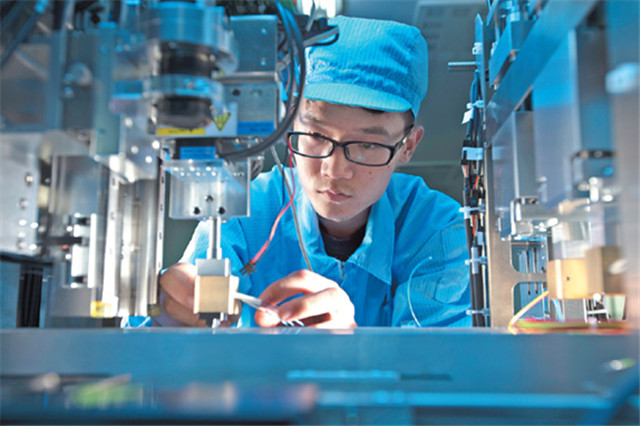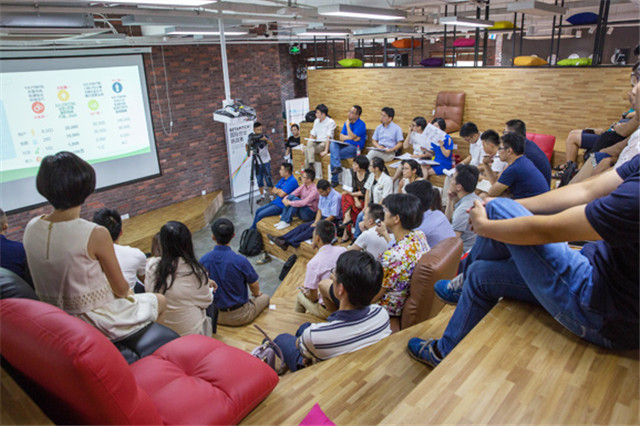


 |
An employee works on the production line at Jiaxing Join Intelligent Equipment Co. [Photo/China Daily] |
Editor's note: In the run-up to the 19th Communist Party of China National Congress, China Daily will report on a number of key projects of national importance that showcase the country's great improvements in crucial fields, such as technology and innovation.
A small county in East China shows that size has no bearing on economic growth
Decades ago, Jiashan county was primarily known for its agriculture and wood industries. It also has a reputation for making quality yellow wine whose sweetness makes it distinctly different from those made elsewhere in China.
However, the county's business landscape was transformed in 1993, when the Jiashan Economic and Technological Development Zone was founded to drive growth. Science and technology have since become the cornerstones of the county's success.
In 2013, Jiashan, in the eastern province of Zhejiang, was singled out as China's only county-level demonstration zone for scientific development, and today its key industries include precision machinery and electronics.
On Sunday, President Xi Jinping said county-level governance is crucial to the modernization of the national system of governance, and Jiashan has taken full advantage of its location and set up a good example for scientific development, according to reports on China Central Television.
Xi visited Jiashan in 2004 and 2005, when he was Party chief of Zhejiang, and he paid another visit in 2008 when he was vice-president.
Developmental pillars
One of the pillars of Jiashan’s economic development is automation. According to official data, the county has spent 20 billion yuan ($3 billion) to help 450 companies implement automation initiatives during the past three years, resulting in productivity rising by 12.3 percent.
The high-tech manufacturing sector has also been identified as a major player in the county’s development plans.
HT Tech is a good example of the sector. Founded in 2009, the company supplies state-of-the-art precision equipment to semiconductor manufacturers around the world.
Strong government support enabled the company to grow from a small five-man operation to a 110-person-strong enterprise, according to Chen Yilun, general manager of HT Tech’s machine vision business unit.
 |
People watch a road show at the Jiashan Economic and Technological Development Zone. [Photo/China Daily]
|
“We were looking for a place suitable for manufacturing, but large cities just didn’t have the sort of space required. We also wanted to be close to a large city to attract talent,” said Chen, explaining the company’s decision to base itself in Jiashan, which is just 80 kilometers from Shanghai.
Jiashan county, which has a population of 750,000, is a 20-minute ride on a high-speed train from Shanghai, its bustling neighbor, and less than 100 km from other major business hubs such as Suzhou in Jiangsu province, and Hangzhou and Ningbo in Zhejiang province.
“The government provided us with very good service support in every aspect. It put us through an incubation program and helped to coordinate many things necessary for the company’s operations, including the construction of the facility,” added Chen Yilun, general manager of HT Tech’s machine vision business unit, who studied in the United States.
European ties
Another project aimed at attracting investment is the Sino-Dutch Industrial Cooperation Park, located in the Jianshan Economic and Technological Development Zone. Officially opened in May last year, the park provides a platform for companies from China and the Netherlands to cooperate in matters related to investment, trade, education, training and financial services.
“Much of the county’s overseas investment used to come from Taiwan, but we’re now looking to bringing in more from Europe,” said Wang Yuqing, the zone’s vice-director.
“Despite its name, the park does not just facilitate bilateral trade between China and the Netherlands. This zone can also be used as a stepping stone for Chinese businesses to enter the European market and vice versa.”
Several large companies from the Netherlands have set up shop in Jiashan, including the brewer Heineken, which invested more than $100 million to build a factory in 2014, and chemicals producer Akzo Nobel.
Having identified a growing demand for paints and coatings by China’s thriving wood coatings and furniture sector, especially in the area around the Yangtze River Delta, Akzo Nobel opened a manufacturing plant in Jiashan in 2003.
George Sun, the site manager at the Jiashan facility, listed a number of factors behind the company’s decision to establish a presence in the county.
“Jiashan is located near Shanghai, which means top talent is easily accessible. Furthermore, the cost here is still considered very reasonable when compared with the surrounding major cities,” he said.
“I have dealt with officials from several governments in the region but those in Jiashan are very different in the sense that they are incredibly service oriented. They are always coming to the site to find out what we need to grow.”
Attracting talent
The county has also identified foreign talent and investments as another pillar of growth. According to Shen Xuelin, director of the Jiashan county bureau of commerce, the county attracted as much as $300 million in foreign investment last year and is currently home to 10 of the world’s top 500 companies. Some of the big names located in the development zone include Berkshire Hathaway, Goldman Sachs, Foxconn and Pegatron Corp.
In March, Jiashan introduced a raft of new policies to attract talent, among which was 100 million yuan ($14.6 million) in funding for programs led by top talent. The Shanghai Overseas Returned Scholars Association and the Jishan government also organized a competition for startups in electronic information and healthcare, with the winners walking away with prizes worth as much as 150,000 yuan. Winning startups that registered their businesses in the county were also given subsidies amounting to as much as 6 million yuan.
The county’s efforts to attract foreign talent and overseas returnees also include spending 20 million yuan on building apartments, subsidizing living and education for school students, and improving air quality through pollution–control measures.
These policies have attracted entrepreneurs from Taiwan. Monry Ho is an example of how Taiwan residents have thrived in the county. Having first arrived in Jiashan 17 years ago, Ho now owns several companies, including a motor components factory and a precision-forging facility.
“At that time, many of my friends recommended that I come to Jiashan because they knew the local government was providing strong support to overseas investors. There were fewer than 10 companies from Taiwan when I first arrived,” he said.
Official records show that Jiashan is the most prolific Taiwan investment zone in Zhejiang province, with more than 2,000 Taiwan residents owning about 500 companies.
In line with the county’s drive toward innovation and sustainability, Ho has been steadily upgrading his factories since 2015, replacing old machines with semi- or fully-automatic versions. He has also replaced the air-conditioning systems in his facilities with a high-tech geothermal pump, a heating-and-cooling system that transfers heat to or from the earth.
“The pump helped my businesses to reduce emissions and electricity consumption. It was expensive to install, but it is greener and will help with cost savings in the long run. Automation and innovation allow us to be more efficient. Without new technology, a company cannot possibly develop and be competitive in the market,” he said.
A large number of people from Taiwan who live in Jiashan come from the younger generation. Li Guofei, whose family hails from Kaohsiung city in Taiwan and owns the World Expo Hotel in Jiashan, decided to expand the business by opening a boutique hotel called the Nine House.
Situated in the county’s Xitang Ancient Town, the modern bed-and-breakfast establishment has been featured in design websites and magazines in the United States and South Korea. Li plans to introduce more such boutique hotels to the countryside and urban areas in the future.
A sweet experience
The establishment of Li’s boutique hotel came on the back of the local government’s push to use tourism as another catalyst for economic growth.
Last year, when the Nine House opened, Jiashan’s Dayun town was one of the first locations in Zhejiang to be designated as a demonstration zone for tourism development. The town’s two largest tourist magnets are the Yunlan Bay Hot Springs and Aficion, a chocolate factory that takes visitors through a tour of its production process and the history of chocolate.
According to official statistics, the county received more than 13 million tourists from around the world last year — a rise of 45 percent from 2015 — and generated 15 billion yuan in revenue. The local government expects tourism revenue to hit 30 billion yuan by 2020.
“The chocolate factory is at the core of our tourism strategy, which is based on the concept of sweetness. This core is supported by other segments such as our flower trade, hot springs and wedding photography. We aim to provide tourists with a sweet travel experience,” said Lu Yun, the secretary of the Party committee of Dayun town.
“Looking forward, the government will continue to provide strong support to tourism enterprises in the town to provide visitors with a greater selection of travel services and products. We don’t want to be just a provincial-level tourist destination — we want to become a national travel hotspot.”
Cao Chen contributed to this story
© China Daily Information Co
